A Thousand Words (and then some) on the Potential for Changing International Relations
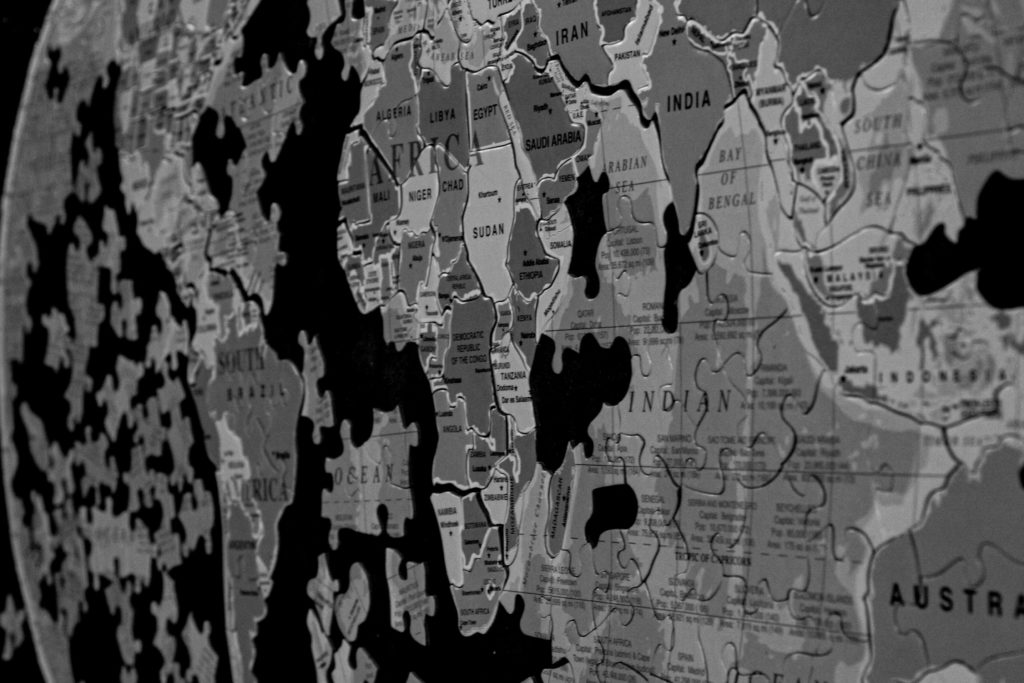
This post is actually about an image (and its implications) that I had intended to write about a while back. It was inspired by a comment on my post about Pompeo’s belligerent behavior vis-a-vis Mary Louise Kelly as linked to the fact that we in the US, and especially this administration, are hanging onto events that happened four decades ago (the Iran hostage crisis).
This post is about the fact that it is possible to get over past conflicts and move forward. Let me note that this is not a Kumbaya appeal nor is it an assumption that cooperation (or, simply, non-belligerence) is easy. But rather an attempt to note that the US is more than capable of finding a way to deal with a former adversary. Indeed, finding ways to cooperate (trade, communication, interchange) is a more efficacious route than violence.
In the comment in question, a contrast was raised between Vietnam and Iran and the distance between the end of the Vietnam war and normalization of relations versus the distance between the Iran Hostage Crisis and now.
The answer to that question is as follows. Saigon fell on April 30, 1975. Formal diplomatic relations were restored in July of 1995 (the final embargo, affecting the sale of arms to Vietnam, was lifted in 2016). So, for all practical purposes, the US was able to deal with Vietnam a mere two decades after the end of the war, but while twice that much time has passed we are still hearkening back to the hostage crisis as a reason to maintain a belligerent posture towards Iran (and yes, I know that isn’t the only reason).
Still, here is Trump earlier this month:
And Pompeo cited “they held American hostages in our embassy in Tehran” as part of the reason for our Iran policy.
To put this is context, the US government reports 58,220 American died in the war. There are various estimates of Vietnamese deaths ranging up to 3,000,000. A demographic study in 1995 put the figure at about 1,000,000.
And yet, somehow, Americans and Vietnamese how found a way to reconcile. And, I would note, we did so without the US winning a military conflict with Vietnam (quite the opposite) and with Vietnam still governed by the Communist Party of Vietnam.
Indeed, I visited Vietnam for the first time back in October, where I felt thoroughly welcomed. My Photo for Friday on October 18th and 25th were from My Khe beach in Da Nang (aka, “China Beach”). That which was once the initial landing site of US troops is now lined with luxury hotels and upscale restaurants and bars.
Indeed, my university has had successful partnerships with several Vietnamese universities for almost twenty years with partnerships with schools in Saigon, Hanoi, and Da Nang.
So, let me throw out another quick 1,000 words:
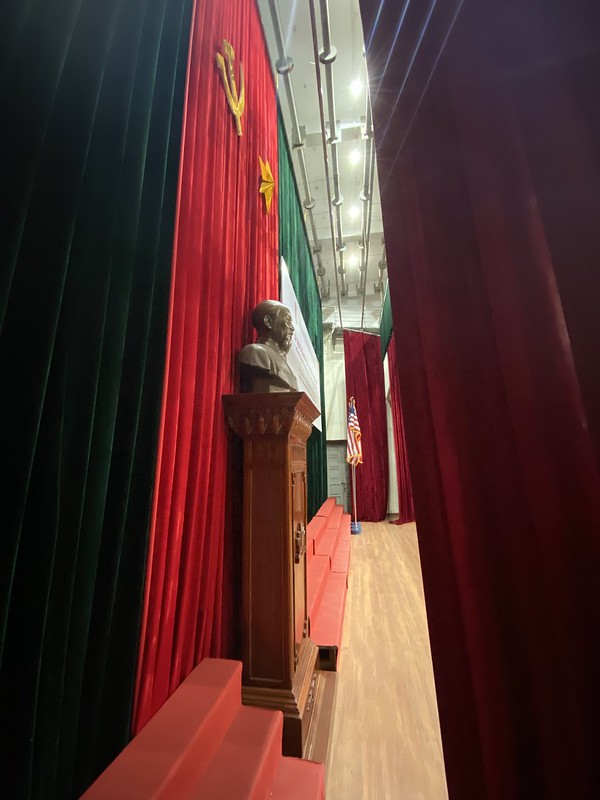
I took this from backstage right before a graduation ceremony of students in the US degree program that we have at Hanoi University of Technology (HUST). Roughly 25 business administration and computer science students earned their Troy University diplomas that day. We see here the bust of Ho Chi Minh, the hammer and sickle, the red star, and the US flag across the stage.
Even a modicum of historical understanding is enough to understand how fascinating the contents of the photo are (and how weirdly contradictory at first glance). If all those symbols can coexist in a positive context, then there is hope for dialog and constructive engagement, even between the US and Iran.
I participated in two such graduations (the other for a similar program at Vietnam National University) as well as an induction ceremony for a new intake of students. At each the national flags of the US and Vietnam were on display and the national anthems of both countries were played.

Clearly, the end of the Cold War allowed the normalization of relations with Vietnam in a way that is not at all applicable to Iran. Nonetheless, the JCPOA represented a possible way closer to a thaw than the current “maximum pressure campaign” does. Further, the US’s track record on regime change is pretty abysmal, especially in Gulf region.
If the Vietnamese can move past the death and destruction the US visited upon them, and the US can avoid a grudge over 58,000 fatalities in that war, perhaps we can move past 52 hostages taken over forty years ago. I say this knowing that US actions have cause Iranian injury and death and vice versa over time.
Perhaps letting go of the hurts from ~40 years ago would be a good start (no to mention coming to terms with our involvement in the 1953 coup and the resultant rule of the Shah, who was no saint).
I know that the cross application of interstate outcomes is limited. The conditions for US normalization with Vietnam is a different thing than with Iran. But by the same token, the gulf between the US and Vietnam was actually quite a bit larger than the one between the US and Iran. A good way to start bridging that gap would be to try and move on from event from four decades ago.


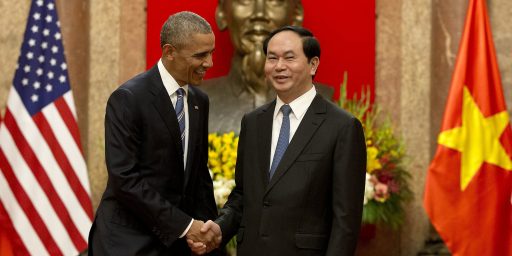

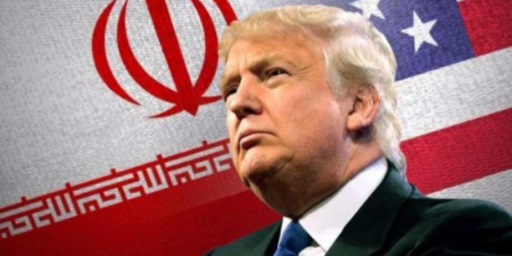
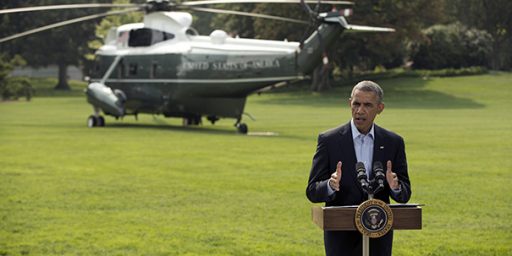
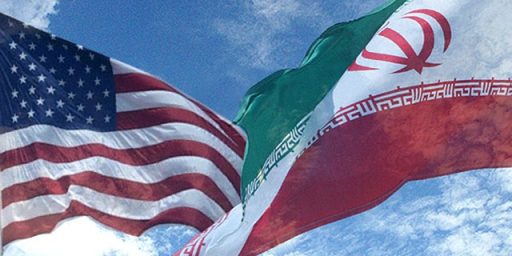
It’s not that the US can’t move on, it’s that it doesn’t want to. Mainly because of Israel and Saudi Arabia.
Vietnam, at least, has the advantage of being useful for containing China.
There are probably some psychological reasons, too, but Israel and the Saudi “alliance” are the most important ones, I’d guess. This includes, by the way, the Evangelical vote and Saudi oil money. Just look at how the GOP screamed bloody murder after Obama signed the JCPOA.
We bombed a lot of Germany flat in the mid-1940s and made them an ally before 1950.
Certainly that had a lot to do with the rise of the USSR and institution of the “Iron Curtain,” but still.
Well, we need enemies, right? Indians, Brits, Canadians, more Brits, more Indians, Mexicans, each other, more Indians, Spaniards, Filipinos, still more Indians, Germans, Japanese, Germans again, the USSR, China, North Korea, North Cuba, North Vietnam, North Panama, North Granada, Iraq, Afghanistan, more Iraq, Syria, Iran. Did I miss anyone?
Who is responsible for drug epidemics in the US? Not us, certainly. Mexicans. Colombians. They keep forcing us to buy drugs. And whose fault is it that we use cheap labor from over the border? The Mexicans, duh, also Salvadorans.
It’s the peculiar genius of Americans that we stole most of a continent by means of disease, imposed starvation and slaughter, unapologetically kept the whole of it, and then wrote stories and shot movies about how brave we were as thieves. And got most of the world to nod along, yep, yep, brave pioneers. We’ve attacked or invaded more countries than just about any power aside from Great Britain (they’re number one!) and still manage to ride our moral high horse. We haven’t won a war since V-J Day but we still worship our military prowess.
No one bullshits history like we bullshit history. If the Turks had half our genius they’d be touting the genocide of the Armenians as an example of their bravery and resourcefulness.
We don’t know what to do as a country without enemies. There is always a Eurasia, always an Eastasia and they are always bad, bad people who we must hate. If every country on earth disappeared aside from the US and Estonia, Estonia would all by itself form an axis of evil.
I hate to be cynical but I suspect the difference in reaction to these two countries is due to the difference between the Democrats and Republicans. The Viet Nam war, fairly or unfairly, came to associated with the Republicans when Nixon and Agnew ran on a platform promising victory. In subsequent years the Republicans wanted to move past and didn’t want to reignite that association in the public’s mind and so let it happen (albeit) grudgingly. But the hostage crisis, fairly or unfairly, is associated with a Democratic President. Republicans feel it benefits their party to keep resentment alive and so they will never normalize relations while a significant number of voters can be biased to anger and resentment.
In 1389, on a field in Kosovo, the Serbian army led by Prince Lazar met the Ottoman army led by Sultan Murad. Both armies were annihilated and both leaders killed. Crows feasted on the corpses and it became known as the Field Of Blackbirds.
It was a significant blow for the Ottoman Empire going forward, as they lost a good chunk of their forces. It was an even greater blow for the Serbs, as they lost the vast majority of their forces and now had a 12 year old prince as ruler. A weakened Ottoman Empire marched north again, and Serbia fell, but they could not continue expanding north.
One year later, the 12 year old princeling with his mother as regent, accepted the authority of the new Ottoman Sultan, and Serbia became a vassal state for several decades.
In Serbian mythology/history, the nation (which was not really a nation yet) was martyred to prevent the Muslims from taking all of Europe (the ottomans hadn’t even taken all of Asia Minor yet…). The Field of Blackbirds became holy ground watered with the blood of martyred Serbian soldiers.
Flash forward to the 1990s, when Kosovo’s Muslim population wants to break away from the rump Yugoslavia, and Slobodan Milosevic appeals to Serbian nationalism to justify a campaign of ethnic cleansing, and was stopped by NATO intervention. It is often claimed that this intervention made Putin extra skittish about NATO expanding into his neighborhood.
So, yeah, I don’t think America is going to forget the Iranian hostage crisis until it is no longer in anyone’s interest to remember it. Maybe if Iran made cheap, good quality blue jeans.
What about Cuba?
Cuba presents no threat at all to the US, and while it may maintain close link to Russia, the Cold war has been over for a while. So why keep the embargo, and reimpose travel restrictions?
I see some parallels between Cuba and Iran. Both had authoritarian regimes sponsored by the US, both overthrew this governments (and installed worse ones), both humiliated the US in some way, and both maintain a long tradition of demonizing America (I wonder why), almost as a fetish, and rather loudly and obnoxiously. Oh, and in both cases, the Big Bad Guy who symbolized the Evil Regime is dead and gone.
The pit of US-Iran relations isn’t on the US entirely. Maintaining hostility to the US has served the Iranian regime’s interest in a way that it didn’t with Viet Nam. The Vietnamese realized that their own geo-political interests were best served by normalizing relations with the US and cooperated with the US on a number of issues, particularly POW-MIA, even before the wars official end.
The US support of Iran’s Sunni enemies is the rational (term used loosely) explanation for Iran’s hostility. You can also bring in Israel, but in many ways that hostility is also nonsensical, except that it provides a whipping boy for the Mullahs. Interestingly Iran’s Jewish population maybe the most secure than in any Muslim country, certainly safer than Christians elsewhere in the ME.
There have been no countries telling us that we must not reconcile with Vietnam. There is at least one country telling us that that we must not reconcile with Iran.
@Kathy:
In the instance of Cuba there is a population of Cuban-Americans, locally influential in politics, that is keeping the fire of hatred against Cuba’s present regime alive. There is no such population of Iranians.
@Dave Schuler:
I’m pretty sure we can safely bump that to at least *two.*
Its a great example of our client states driving our foreign policy.
@Dave Schuler:
Re: Iran
Excellent point. Really, it’s probably two. But the result is the same.
Re: Cuba
Yeah. It doesn’t help that many Americans don’t know the history of Cuban-American relations (nor do they with Iran beyond the hostages.)
Nor does it help that they seem to think all Cubans are Latino. Nor do they know
that Hispanic and Latino aren’t synonyms. Nor do they know that Cuba is ~60% white.
@Dave Schuler: At least two that I can think of…
@Kathy:
Cuba is a great example, as there really is nothing to be gained from the ongoing US posture on Cuba. But man, we do remain upset with those Castros!
(And, as was noted, there has been a domestic constituency that had fueled the flames).
@Steven L. Taylor:
Great post, Steven. One thing I would say is that there is a time limit to how well invoking the hostage crisis will work.
When Pompeo mentions it, he isn’t talking to Millenials or even most Gen-Xers. The oldest Xers were 14 when it happened. He is talking to Boomers, and the few left from the Greatest Generation.
Without a lasting memory of the event, it just won’t hold the same weight.
—
Some old business…
I spent some time thinking about your arguments from the other thread about party as a salient heuristic. You’re correct, that it will remain that way.
It would be nice if voters were more demanding of politicians. But if Pew is in the neighborhood of being correct about the percentage of true swing voters (~7-10%) and they are mostly low interest voters, then change is unlikely.
@Michael Reynolds:
China the first time (Boxer Rebellion).
@DrDaveT:
You mean North Beijing?
It is an imperfect comparison, in truth it is a wildly divergent comparison, except for in one way: Humiliation. One would think that losing the Vietnam war (“Peace with Honor!” gaaaack accckkk…) to such a small and almost inconsequential country at such great human and fiscal expense would be far more humiliating then having a few dozen Americans held hostage for a little over a year, But no.
In fact, the Iranians pile insult upon humiliation, “They made our sailors kneel!!!”
Whatever the reasons for the Republican fixation on Iran (thank you Dave Schuler for pointing out the Israel connection and MattB and MM for noting KSA’s) the Iranians certainly have their number. They yank the GOP chain and they begin to howl.
I’ve met people for whom any thaw with Iran is inconceivable. Iran’s actions don’t help. But unless you believe that the regime ‘s perceived interest are unalterably opposed to ours, or that it’s fatally addicted to the support tyrants, militias, and terrorists, it’s not impossible to imagine that some kind of rapprochement is possible. It wouldn’t happen overnight, with a big announcement and photo op. If we hadn’t bailed out of the JCPOA, it might have been a first step towards detente.
But we live in an international system where ideology complicates these relationships. At some times, a shared moral vision tightens bonds, as it has for NATO and the trans-Atlantic alliance generally. At other times, it makes animosities just as durable, when the moral visions differ. The crusading socialism that once animated Cuba’s and Vietnam’s foreign policies clearly are not there any more. These regimes, and China’s, are communist on their business cards, but really more authoritarian in operation. Where then is Iran in its post-revolutionary cooling off?
The remarkable fact is that Vietnam was able to deal with America a mere two decades after the end of the war. I remain astonished at the way the Vietnamese people have forgiven Americans for the atrocity of the war.
@Ken_L:
I concur–and meant to make that point more forcefully than I did.